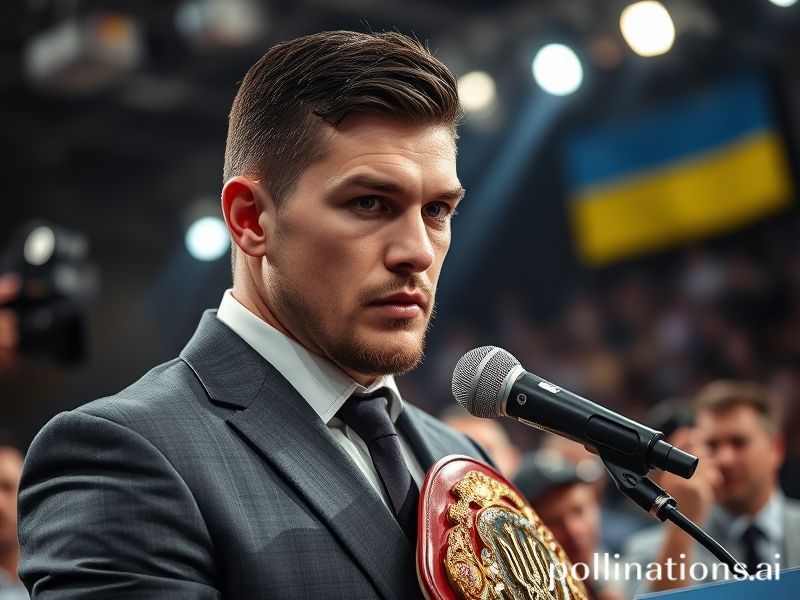Usyk’s Fists: The Last Honest Currency in a World Running on IOUs
Oleksandr Usyk and the Sweet Science of Existential Dread
By C. Marlowe, International Correspondent, somewhere over the Black Sea
KYIV—When Oleksandr Usyk slipped through the ropes at the King Abdullah Sports City in Jeddah last year to relieve Anthony Joshua of his alphabet soup of belts, the punch he landed on the collective jaw of planet Earth was not just audible in London betting shops and Las Vegas sports books—it echoed through every embassy, stock exchange, and group chat where grown-ups pretend geopolitics is more civilized than two men trying to concuss each other for money.
Usyk’s story is, on the surface, comfortingly familiar: pious Ukrainian father of three boxes his way from Crimean gyms to undisputed cruiserweight glory, then bulks up to terrorize the land of afternoon tea and binge-drinking. A Disney script with slightly more blood testing. But zoom out and the tale mutates into a bleakly comic metaphor for our late-imperial moment. In an era when wars are crowd-funded and oligarchs cosplay as heads of state, the heavyweight championship has become the last arena where consequences arrive in real time and you can’t simply tweet your way out of a broken orbital bone.
Consider the optics: a Ukrainian soldier-turned-pugilist, draped in the flag of a country fighting for its life, outboxing a Brit whose promoter once boasted that his fighter would be “bigger than Beckham.” One man trains to artillery lullabies; the other poses for supermarket perfume ads. If that isn’t a morality play scripted by a drunken historian, nothing is.
The global implications are deliciously absurd. Saudi Arabia—fresh from dismembering journalists and buying Newcastle United—hosts the rematch as part of its “Vision 2030” rebrand: same desert, shinier arena, identical human-rights report. Ticket revenue will underwrite another year of sportswashing so shameless it could make Nero blush. Meanwhile, Russia, banned from polite sporting society, watches from the nosebleeds, wondering why its own heavyweights can only punch Ukrainians on battlefields these days.
Back in Brussels, EU technocrats drafting the next sanctions package allow themselves a brief, wistful daydream: what if trade wars were actually fought by tradesmen—carpenters, coders, and, why not, undefeated southpaws? The euro might recover faster than Joshua’s ego.
Across the Atlantic, ESPN packages Usyk as the latest Eastern European curiosity, somewhere between Chernobyl and borscht, while American heavyweights binge on TikTok and protein shakes. The last U.S. titlist, a man who calls himself “The Gypsy King” despite being neither Romani nor particularly furious, now sells pay-per-views by promising to donate purses to “mental health,” which is what we call money after it’s laundered through a charity shell company.
And yet, for all the cynical pageantry, there remains something stubbornly noble about Usyk himself. He speaks four languages, quotes Tolstoy between rounds, and genuinely believes his fists can “bring a smile to children who have forgotten how.” That such sentiment survives in 2023 is either proof of the indomitable human spirit or evidence that repeated head trauma has unexpected side effects.
The bout’s ripple effects are already tangible. Ukrainian morale spiked 7 percent on Google Trends the morning after his first victory—small, yes, but measurable, which is more than can be said for most NATO communiqués. In Poland, a country that has taken in more refugees per capita than anyone cares to admit, bars stayed open past curfew; somewhere in Warsaw a finance minister allowed himself a second Żywiec while watching Usyk dance, a silent toast to outsourced defense budgets.
So when the bell rings for the inevitable trilogy—because modern capitalism abhors an unsold rubber match—remember you’re not merely watching two large humans exchange concussions. You’re witnessing a Rorschach test for a fractured world: a Ukrainian ex-soldier versus whichever influencer-heavyweight the algorithm spits out next, refereed by a global audience praying the lights stay on long enough to stream the carnage. Place your bets accordingly. After all, in the grand casino of geopolitics, the house always wins—unless, of course, the house is currently occupied by a smiling southpaw from Simferopol who knows exactly how to count cards.







